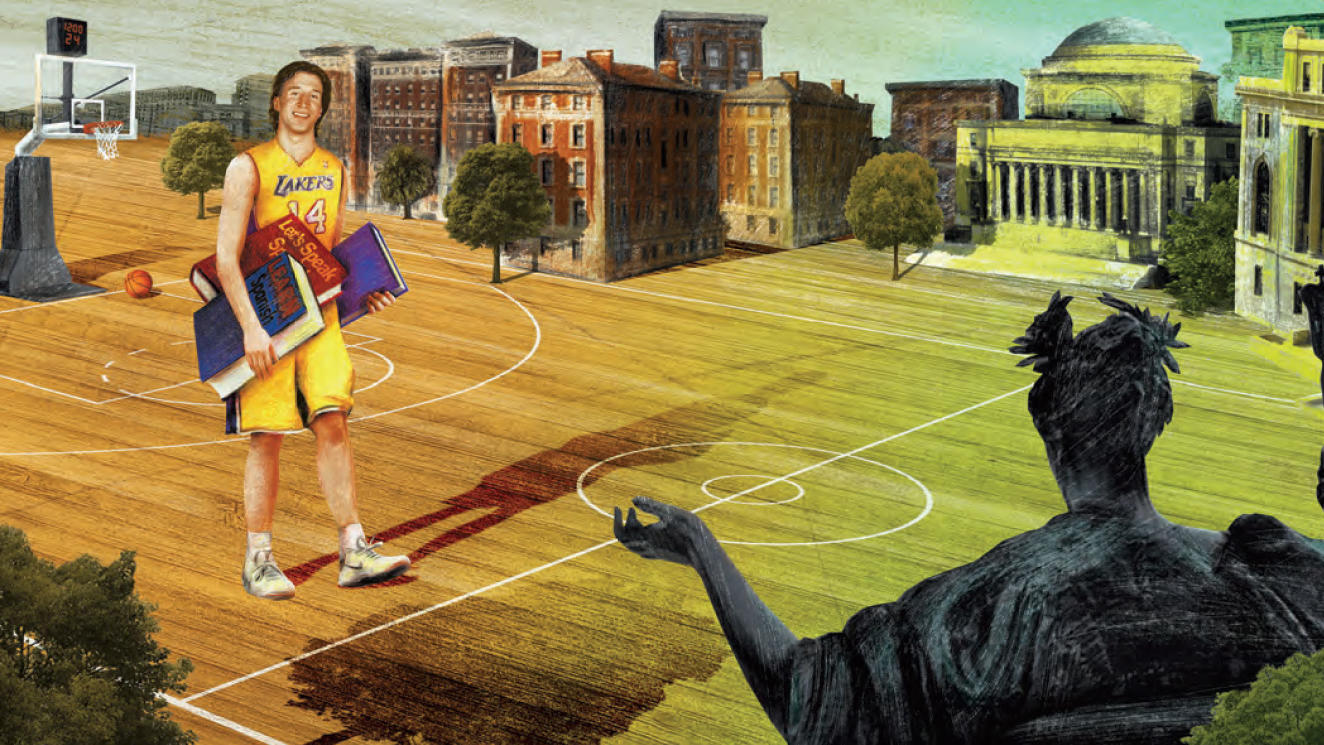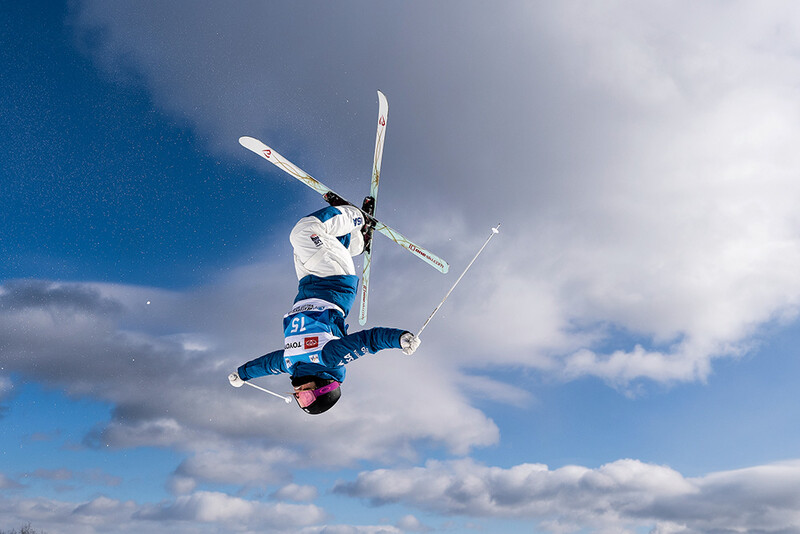Troy Murphy ’15GS is used to being watched, but I have definitely crossed the threshold into staring. The rest of the lunch crowd at the Deluxe diner on Broadway has, too. It’s not every day you see a six-foot-eleven man stoop through a restaurant door, and the purple welt above his right eye only adds to the intrigue.
Murphy is friendly and soft-spoken when he introduces himself, and I resist my temptation to ask about the shiner above his eye. Surely he’ll confide in me once he realizes that we share a bond as college athletes turned Columbia students. This common foundation, I hope, will overshadow our minor differences, such as how Murphy played basketball while I played football, or how after college he began a career in the NBA, whereas I moved back to my parents’ house and slept in a bedroom with dusty plastic trophies and rocking-horse wallpaper.
We take a seat at a small table in the corner, and I get down to business, athlete to athlete. I ask Murphy, now retired after twelve in the NBA, whether his strict self-discipline from his playing days has carried over to his new life as a student. Before he can answer, our waiter appears, and I order a deluxe grilled cheese with bacon and a side of fries.
“The usual for me,” he tells the waiter. “Six egg whites and a glass of water.”
Murphy’s fork looks like an oyster fork in his enormous hand, and I wonder if this larger-than-life superstar ever feels out of place in class as he wields a little pencil in front of gawking students. Looking at him, it’s as if basketball was invented specifically for Troy Murphy, or vice versa. He can almost reach a ten-foot-high rim without jumping, and his sinewy legs more than make up the difference by effortlessly springing him three feet in the air. His seven-foot wingspan matches his height, and while Murphy was in high school, college scouts flocked to Morristown, New Jersey, to see if this XXL Vitruvian Man was for real. But what ultimately got Murphy recruited to Notre Dame (where he was twice named a consensus first-team All-American) was a level of agility and body control that is rarely found in someone with so much body. His nimble vectors to the hoop would surprise opponents just as much as the quick release and deadly accuracy of his long-range jump shots. On June 27, 2001, Murphy was selected by the Golden State Warriors with the fourteenth overall pick in the NBA entry draft. The sociology major was still a year away from graduating.
“My parents are both teachers,” Murphy says in between giant bites of egg white, “so leaving college early took a little convincing.”
Even as he established himself as one of the league’s premier rebounders, there seemed to be an unspoken understanding that Murphy, a former selection to the Big East Academic All-Star Team, would return to school to earn his bachelor’s degree. After 729 games of pounding joints on the hardwood, one would hardly have blamed him for taking a much-deserved three- or four-year nap. But just thirteen months removed from his last professional game in 2012, the thirty-three- year-old Murphy walked through Lerner Gate, his next career as blank as the notepad he carried into orientation.
“I’d be hard-pressed to name any professional athletes who know exactly what they want to do after they retire,” Murphy says. He doesn’t know yet where he’ll head after graduating from Columbia, but he’s already in a much better position than many of his retired peers: in 2008, an NBA players’ association representative estimated that 60 percent of NBA players are broke within five years of their final game. Some of this struggle to adjust can be attributed to truncated educations — while nearly all NBA players attended college, only about 20 percent of them earned degrees — but Murphy suggests the greatest source of post-NBA adversity is the inability to reconcile a new-found restlessness. To find a new professional outlet comparable to the adrenalized fervor of the NBA is a tall order for young men with decades still ahead of them.
Today, rather than taking free throws in packed arenas, Troy Murphy is taking intro Spanish, where he conjugates hablar in front of a dozen college freshmen. But to see this as a downgrade, Murphy explains, is to miss the clear intersection between the NBA and Columbia.
“What I miss most about the NBA is the competition — the feeling that you’re going up against the best in the world. But that’s also what attracted me to Columbia: the chance to be around some of the best students in the world. I can re-channel my energy to get to the top of something new. It’s the challenge — I love it here.”
And you can tell he means it. While most students lament difficult assignments, Murphy relishes them. I notice he discusses his victory over a math problem set with the same exuberance, intensity, and pride he uses to explain his man-to-man defensive techniques. And get him going on his essay about Walker Percy’s philosophy of semiotics and you’ll get a chance to eat your entire bacon grilled cheese without putting it down.
“And Spanish class,” Murphy continues, now grinning and scratching his forehead just above the purple welt that he got, it turns out, from playing in a pickup game. “Spanish — now that’s a battle.”
I ask him what’s more intimidating: squaring off against the notoriously competitive NBA legend Kevin Garnett, who head-butts the net post as a means of pre-game invigoration, or his Spanish class.
“Garnett,” he answers, finally, after some thought.
Speaking of Spanish, it’s time for Murphy to get to class. He loves the course, though he does have a small gripe with his classroom’s desks: Murphy’s body was made for basketball, after all, not for the tiny wooden chairs of Hamilton Hall. He’ll squeeze into his chair, though, and as the ache of an old back injury yields to the even greater strain of a challenging Spanish unit, Murphy will be reminded that Columbia is the right fit.



